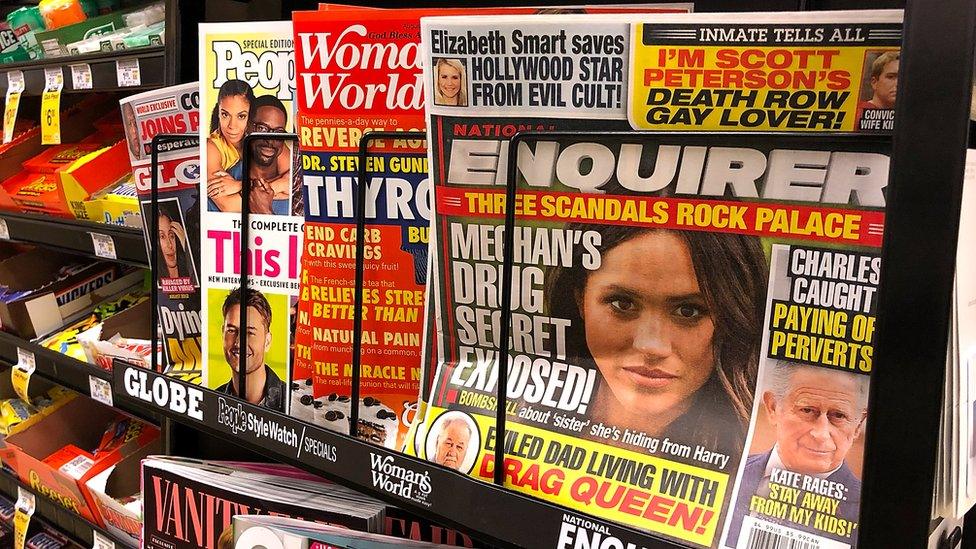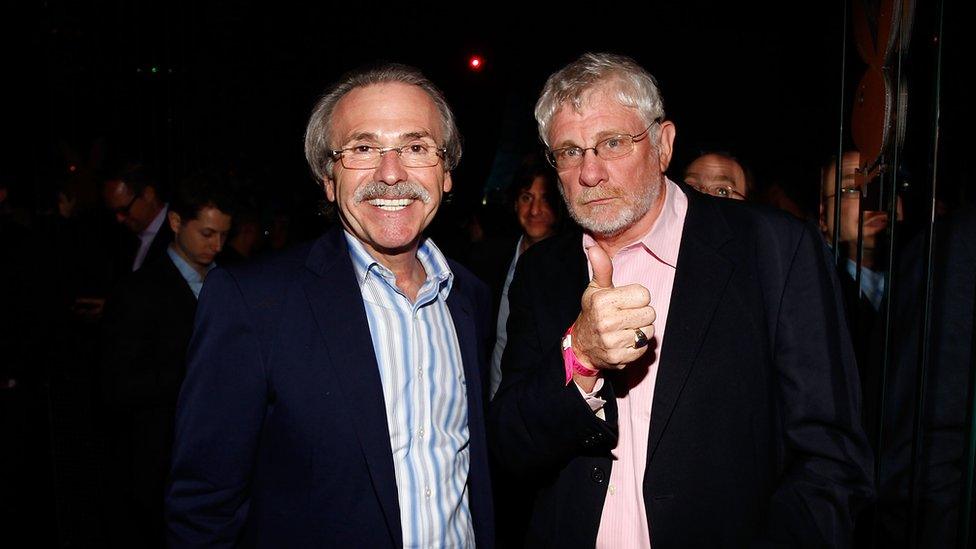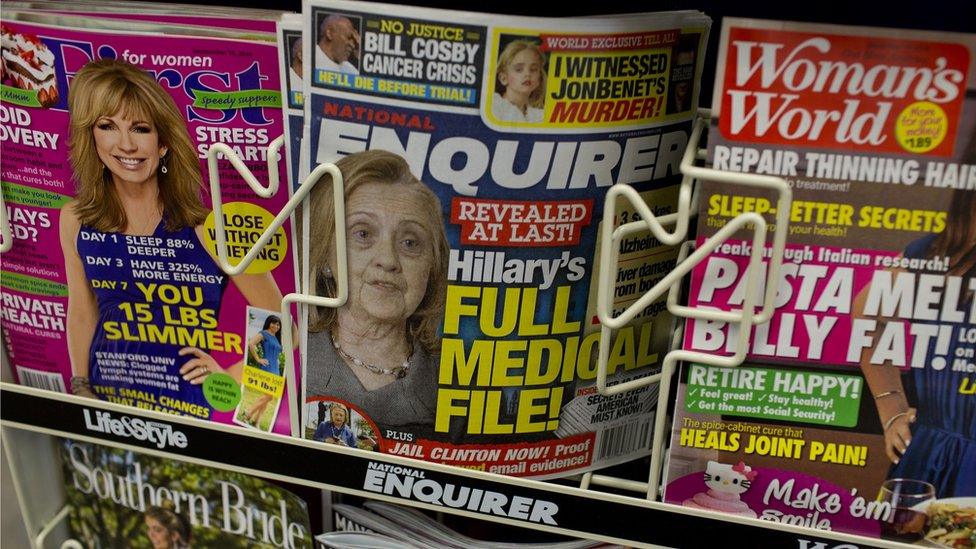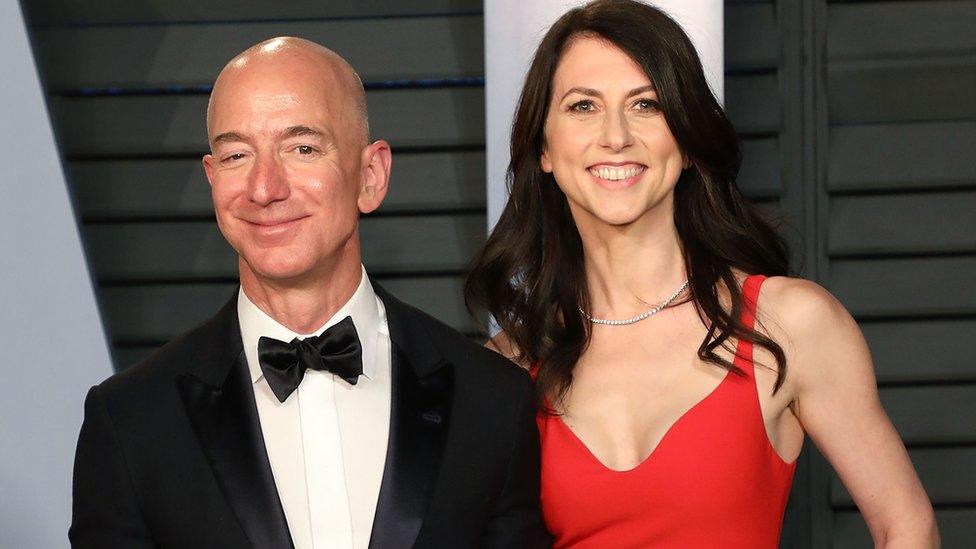The National Enquirer: The publication accused of Bezos blackmail
- Published

The newspaper has gained a reputation for outlandish celebrity coverage
US gossip magazine the National Enquirer has found itself, again, at the centre of a huge news story of its own.
Its owners, who last year admitted to helping hide allegations about an alleged affair involving Donald Trump, have been accused by Amazon founder Jeff Bezos of trying to blackmail him over lewd photographs.
The world's richest man released bombshell details about the accusations in a lengthy blog post on Thursday.
But what is the National Enquirer? And who are the parent company and man behind it?

The tabloid is best known for its outlandish celebrity gossip and crime coverage.
It was originally founded as The New York Evening Enquirer back in 1926 - when it was distributed as a broadsheet on a Sunday.
After changing hands to Generoso Paul "Gene" Pope Jr in the 1950s, it was shrunk down to a tabloid size. He renamed it and began to focus more on sensationalised gory stories with headlines like: "Mom boiled her baby and ate her."
Targeting supermarket check-out distribution in the 1960s, the owner lessened the gore and increased its celebrity coverage.
The publication has been unashamed in its use of payment for interviews and photograph scoops since.
It has covered some of the country's biggest scandals - including the Monica Lewinsky affair and OJ Simpson's trial.
At its peak it had a weekly circulation of millions, but the internet has had a huge impact on sales. Last year it was announced circulation had dropped to about 265,000 - 18% down in one financial year.
Its most popular front-page ever was of Elvis Presley dead in his casket - which reportedly sold more than 6.5m copies.
The publication was bought by American Media Inc (AMI) in 1999. The group already had a substantial number of US tabloids and gossip magazines in its portfolio.
The group hired David Pecker as their chief executive - a New Yorker who originally trained as an accountant before getting into publishing.

David Pecker (left) at a Playboy event he hosted
A 2017 New Yorker profile explored how their headlines are firmly anchored in formulas and celebrities they know sell well, external.
Journalist Jeffrey Toobin observed that a lawyer is on call at all times to check stories and try to mitigate against any potential libel issues.
US tabloid culture
Over the years, the National Enquirer has been no stranger to controversy and, occasionally, lawsuits over its coverage.
In the US, tabloids have a reputation for outlandish reporting - in part because the standard for libelling public figures in the US is high. It has to be proven that there was "actual malice" behind any libel claim.
Any figure wanting to sue could face a protracted and expensive legal battle - which could draw even more attention to any substantiated claim.
The National Enquirer was first sued for libel by actress Carol Burnett over a 1976 report that she had been drunk and boisterous in an encounter with then-US Secretary of State Henry Kissinger.
Burnett, a campaigner against alcoholism, fervently denied the allegations. A California court sided with her and she was awarded a $1.6m settlement - but the National Enquirer appealed. Eventually the two parties settled out of court.
Others tried the same in the aftermath, but cases remain hard to prove.
Apologies and retractions from the National Enquirer are also considered rare, but it also has an edition in the UK - where libel laws are far tighter.
In 2006 actress Kate Hudson was able to win damages at the High Court in London over a two-page story which falsely implied she had an eating disorder.
Ties to the president
By Mr Pecker's own admission, he and President Trump are good friends.
In the 1990s Mr Pecker ran a publishing house that distributed a magazine named Trump Style around Mr Trump's resorts and properties.
Mr Pecker also attended Mr Trump's 2005 wedding to Melania.
When the real estate mogul announced he was running for president, the Enquirer endorsed him and disparaged his opponents.
Reports in US media suggested stories about the race were sent and reviewed through Mr Trump's lawyer, external before publishing - though the National Enquirer denied this.
At one point during the election race, the tabloid ran a front page that said Hillary Clinton had "6 MONTHS TO LIVE!"

They also made allegations about his Republican opponents - alleging at one point that Texas Senator Ted Cruz's father had direct links to the assassination of John F Kennedy.
The tabloid labelled him "pervy Ted" and falsely alleged he had several extramarital affairs.
Mr Cruz at the time labelled the affair story "garbage" and accused "Donald Trump and his henchmen" of attempting to smear him.
'Catch and kill'
Mostly notably, AMI has admitted helping Donald Trump's campaign bury a report about an alleged extramarital affair with a former Playboy model.
Federal prosecutors announced in December that AMI had admitted paying Karen McDougal $150,000 (£115,000) for a "catch and kill" on her story in the run-up to the 2016 election.
Officials said they did so "in concert with a candidate's presidential campaign" to ensure the damaging allegations did not get out before the vote.
AMI entered into a non-prosecution agreement in exchange for their admission.
Mr Pecker also reportedly received immunity from an investigation into President Trump's long-time lawyer Michael Cohen - who now faces jail - in exchange for information.
Bezos blackmail allegations
As the New York Times reports, tech giants aren't the usual subject of the National Enquirer's focus, external - making some believe it was his links to the Washington Post newspaper that made him a target.

Bezos and his wife Mackenzie announced their divorce hours before an Enquirer revealed details of his affair
The tabloid has already published intimate details of his alleged extramarital affair - including private message exchanges.
Mr Bezos launched a private investigation into how they got their hands on that information, an action he now says has brought threats of intimate photograph leaks.
"It's unavoidable that certain powerful people who experience Washington Post news coverage will wrongly conclude I am their enemy," he wrote in a blog post.
After this, he pointed to President Trump's tweets about himself, external but also cited his newspaper's coverage of the death of Saudi journalist Jamal Khashoggi - a former columnist - which he said was "undoubtedly unpopular in certain circles".
Mr Bezos also pointed to an Associated Press report about a 97-page glossy magazine produced by AMI that praised Saudi Arabia and Crown Prince Mohammed Bin Salman. It appeared across the US last April, external.
Prince Mohammed has been accused of involvement in the death of the journalist - a charge the Saudis deny.